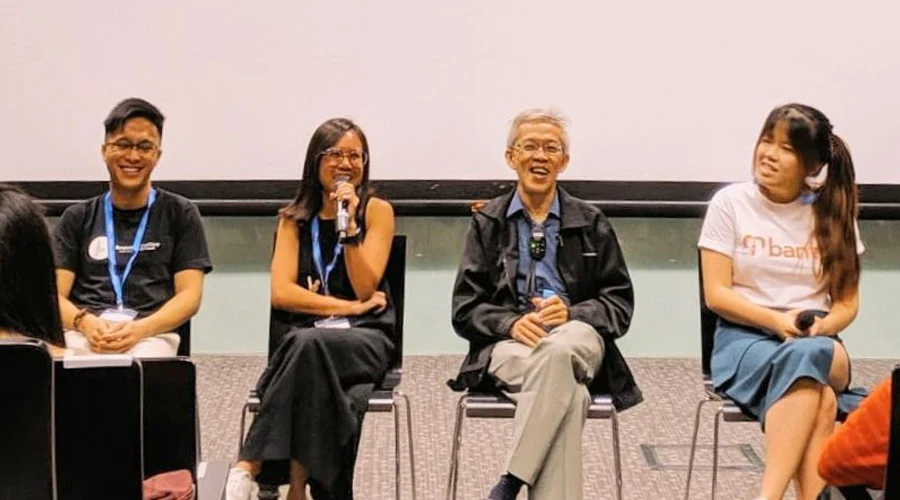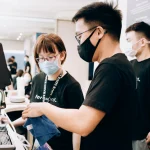This blogpost goes out to those who want to make a difference in the lives of others by joining a social enterprise startup and to create impact larger than what can be done by themselves. I’m not talking to the founders of the startup as the founders usually have the most compelling reasons to stick around their company with or without an end in sight and toiling the most nights to work things out. Employees, on the other hand, may have fewer reasons to commit to the same level as the founders, but there are gems who would take the leap of faith and make things work with the founders. Are you one of them?


I was part of the panel on “Stories of Social Entrepreneurs” held as part of the NUS Enterprise Summer Programme. It was a privilege to be on this panel, moderated by Prof Wong Poh Kam, with other social entrepreneurs from WateROAM, Society Staples, Bantu, Sustainable Living Lab, and Jaga-Me. Photo credits: NUS Overseas Colleges (NOC)
Janelle, one of the co-founders of Bantu, a social enterprise that builds technology around the social sector to make helping others easy, shared jokingly in a panel discussion that she hopes for those who wish to copy her startup’s idea to join her company instead of starting one on their own. And there are truths to this. It is not easy to start something from scratch and if you believe in the social cause of a startup that is already in operation, why not join them?
The panel discussion was titled “Stories of Social Entrepreneurs” which invited social entrepreneurs from Sustainable Living Lab (SL2), WateROAM, Jaga-Me, Bantu, Society Staples, and, last but not least, Foreword Coffee (that’s us!) This panel was one of the many activities lined up for the annual NUS Enterprise Summer Programme, a two-week programme centered on entrepreneurship attended by close to 200 participants from 20 countries. Professor Wong, the moderator of the panel discussion, was cheekily trying to get us panelists to share the possibility of us expanding our business operations overseas.
One of the recurring themes to consider for overseas expansion is trust. Of the panelists who shared their difficulties in expanding overseas, they commented that it was difficult to find people that they trust to work with and they usually end up working with their friends — people whom they meet during such social entrepreneurship events that believe in the same vision as them.
Let’s talk about trust.

Our ex-intern, Ethan, with his bros during our appreciation lunch held for our team, families, and partners. Ethan did a 6-months internship with us through the NUS Overseas Colleges Programme (Singapore). Photo credit: Keith Goh (our Monday Barista!)
Bringing the context back to Singapore and the discussion on what it takes to join the social start up game, the word “trust” can never be overemphasized. I always tell my team that I would not be having the difficult conversations with them if I do not trust them, and that they would have long been “expelled” from the company if the trust was broken. As one that upholds Foreword Coffee’s value system and culture, trust is never compromised.
It takes trust for someone to join a startup because the life of a startup is unstable, unpredictable, and never comfortable. For a social startup that deals directly with our beneficiaries (who are our employees), we face yet another challenge — having to create certainty for our people while riding this rough ride. Our beneficiaries / employees enjoy going to work. They work hard to fulfill their jobs, to serve great coffee and provide great customer service to our customers. For the team who serves the beneficiaries, we work hard to enable them to work efficiently while expanding the business functions in multiple areas. We work harder so that the social enterprise have the potential to scale up and benefit more people in the future.
I recently dealt with a negative experience in hiring a person who expressed great interest to join the company to help us in our operations and grow the capability of our company. We met this potential hire multiple times before signing the contract because we wanted to allow this person to have a taste of what we do, the people we serve, the communities we belong to, and to experience the values that we uphold. Everything was smooth and the person was very agreeable with what we do, until the moment we needed to sign the contract. Keeping the story short, I eventually decided to withdraw the letter of offer from this candidate as there were too many back and forth on trying to negotiate on the details of the contract without proper handling the negotiation in person, on the part of the candidate. I felt some information was withheld by the candidate and I lost trust in this candidate.
I was not looking out just for what was being said and promised, but what was left unsaid.

Nadi and I, driving our new coffee cart out for the first time to the Social Service Summit 2019! Having to work with each other through days and nights, we cannot emphasize enough the importance of trust between us to get work done.
This experience left me with some learning points when it comes to hiring for / joining a social startup.
1) It is natural for the founders of the startup to try to protect the company and its beneficiaries through the employment contract with all its legal terms and conditions written there. To the incoming employee, the contract may seem daunting and it is the role of the hiring manager (which usually is one of the founders) to humanize the contract and explain it in context of the business and its social mission.
2) It is important for the candidate to be open and communicate his/her concerns openly with the founders before joining the startup. If you are the talent the startup needs, you can be sure that the founders will want to listen to you and do their best to accommodate your needs.
3) If you don’t share your concerns, the things left unsaid will not help you in any way. Worse still, things that are not said leave room for misinterpretation and suspicions. This breeds mistrust right from the start of the relationship which could create more mistrust later on.
4) Startup founders must do our due diligence to be familiar with hiring laws and regulations. Your incoming employees will question… because startups give the impression that we are “unregulated”. We must be sure of the content of our employment contract and to comply with the labour laws in the countries we operate in.

The Foreword Coffee team of current staff and ex-interns who are making differences in our own ways, whether at their work or in school 🙂 we continue to keep in touch now!
To our future interns / staff of Foreword Coffee and other social startups… Learn to be vulnerable to yourself. The founders of the social startups should have gone through this process of being vulnerable to themselves, with their cofounders, or with their funders when they shared their story and motivation behind the work. Without being open and communicating with your founders, trust is difficult to be built within such a short time.
By joining Foreword Coffee, you can expect to take on the full responsibility of helping your founders to scale up the business in your areas of expertise. At this point in time, Foreword needs breadth, not depth. We need a range of skills and expertise to cover broad functions necessary for the company to grow and we allow ourselves to buy us time to grow the depth in the skills that we are executing, be it in HR, marketing, operations, finance, and so on.
Finally, it is important for the future and current staff to believe in the shared vision of Foreword and to have trust in the company that we can make a difference together. Only with trust comes commitment and with commitment, we can create greater impact.





